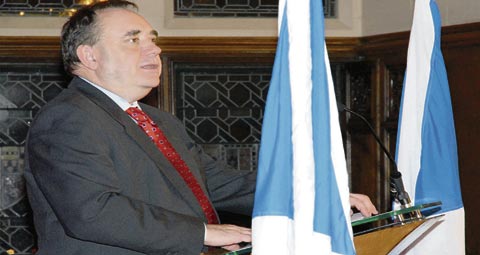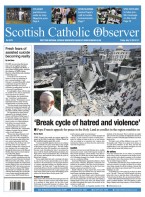BY Ian Dunn | February 3 2012 | ![]() 8 COMMENTS
8 COMMENTS ![]() print
print

Christian opposition to independence
Publication Date: 2012-02-03
Fledgling political party coming to Scotland opposes Scottish Government’s flagship campaign
THE Scottish Government’s campaign for independence was dealt a blow this week with the announcement that the new Christian democratic political party coming to Scotland opposes it.
Michael Elmer, leader of the Centre Democrats in England and Wales, was in Scotland last weekend to meet with leading Scottish Catholics and Christians—including internationally renowned composer James MacMillan—to discuss working to launch the Scottish Centre Democrats in the autumn.
“There needs to be a party for those who embrace Christian values and are willing to claim the centre ground: In economic terms those who reject both planned economies and naked capitalism,” Mr Elmer told the SCO. “I think Scottish voters will be interested in a party that is pro-life in the broadest sense—against poverty and the death penalty as well as abortion—and against independence.”
Christian democrats roots
Mr Elmer, a former academic and diplomat, set up the Centre Democrats three years ago, after a spilt with the Christian People’s Alliance Party. At that time, his party had a fraternal relationship with the Scottish-based Christian Democrats led by the late Teresa Smith. After her death, her organisation was wound up but the Centre Democrats went on to contest council elections in England, with a measure of success.
Mr Elmer is now working to ensure that Christian democratic ideals are moved forward in Scotland.
“I want people in Scotland to get involved and take the party forward, in the Christian democratic tradition that has been successful across Europe,” he said. “What we have seen is that Christians who are members of the main political parties here have found their views crowded out.”
Mr Elmer explained that a key plank of the Centre Democrats would be that of subsidiarity. He said that devolving power to local level was feasible, but he rejected independence.
“I love Scotland, and I am aware I am not a Scot, but as a Catholic there is something in nationalism, a ‘my country first’ element, that I think is not entirely compatible with the universal nature of Catholicism,” he said.
Grass roots support
James MacMillan told the SCO that he would be delighted to join the fledgling party when it is formally founded in autumn. While he had no intention of running for political office, the composer said he would help the party in any way he could.
“As a musician I have a career and a life to lead and I am not a party political person,” he said. “But if I can help this party, facilitate things, raise awareness with any small weight my name has I am very happy to help.”
He added that he hoped the Centre Democrats would return Scotland’s political focus to ‘the more important things in society, like the plight of the disadvantaged who have been completely forgotten with all the focus on referendums.’
“I think there has been a great disillusionment in this country, with the lack of conviction in our politicians, with [Tony] Blair and his focus groups following the money and [David] Cameron’s ditching of core moral truths and values,” he said. “I think there is a vacuum in the centre ground of politics for a new party that would appeal to many ex-Labour voters, not just Catholics.
“So I think there is a place for conviction politicians in the centre ground who will recognise that marriage and the family are the core bedrock of our society.”
Church view
John Deighan, the parliamentary officer for the Scottish bishops, said he believed this new party could have a positive impact on Scottish political life.
“The Church believes that Catholics should find politics to suit them within the framework of the values of the Church,” he said. “However in Scotland we do have a desperate need for an articulate presentation of social values on a spectrum of issues, life and the family in particular.
“In our present climate I would not underestimate the challenge they would have to make a significant breakthrough,” Mr Deighan added. “But I hope their efforts can improve the level of debate we have on important issues, which are examined only superficially by all the major parties.”
Independence
The Scottish National Party’s campaign ahead of the 2014 referendum on independence suffered another setback this week when Catholic businesswoman Michelle Mone said she would leave the country if it voted to become independent of the union.
“I will move my business and I will move personally,” she said. “I don’t think we can survive on our own and I think it would be really bad for business. Everything would go up and I really don’t think we need it at the moment.
“I am so passionate for Scotland but I have to say that if we do become independent, I will move,” Ms Mone added. “I love Scotland but, under independence, I would have no choice.”
Pic: Paul McSherry












This really is fantasy land politics. Honestly, if anyone thinks Michelle Mone’s intervention amounts to a setback they need to think long and hard about what the word setback means. Mone has continually made this threat and in fact did so before the 2007 election when she said she’d move if the SNP were elected which in fact they were. Mone idn’t move but continues ot make her empty threats. MacMillan claims he wants to get the focus on things that matter but surely making the most of your country’s resources for the benefit of its people is the most important job of government. That’s how you tackle poverty and disadvantage, not by indulging in airy fairy fantasising about the UK, which all major surveys show is the most unequal developed country in the world And shouldn’t any decent Christian be rejoicing at the possibility that weapons of mass destruction presently sited here in Scotland will have to be removed. by all means oppose independence but if you’re going to do so on moral grounds we will want to hear more than these platitudes.
Sorry to hog this comments space but it really is unsustainable for anyone to say that Catholicism and nationalism are unhappy bedfellows. Can we say the words, Poland and Ireland, maybe? The Church supports the doctrine of the sovereignty of nations so I really can’t see any doctrinal argument against the existence of a Scottish state – if there is one, let’s hear it.
Michael, please ‘hog’ away….!
I fully support your comments, and I believe there appears to be a worrying trend in the SCO (a paper which I buy, and will continue to buy regularly) in a not so hidden support for unionism. I have no problem with the paper or its editor taking a position on the subject but to somehow suggest that supporting independence is somewhat at odds with being a Catholic is frankly laughable – the previously mentioned countries of Poland and Ireland are clear examples of that.
Maybe an article on what we feel an independent Scotland would ‘look’ like in respect of the social agenda, the position of the Catholic Church within it etc, would be a useful debate which we could all have?
As for Ms Mone, she is hardly worth mentioning (although I’m surprised you didn’t introduce her as a ‘leading’ Catholic) but I don’t know any business person who would make such a business decision without having all the facts to hand. If there is one thing Ms Mone and her ilk are good at is starting conversations with, ‘I love Scotland but…….’
As a Catholic there is in nationalism something profoundly honest and utterly compatible with the universal nature of Catholicism. To suggest otherwise is bizarre.
Independence for your own country is a basic, indeed fundamental human right. No true Christian, Catholic, Protestant or otherwise could ever in their own conscience oppose this. To do so is profoundly un Christian.
I’m afraid this whole exercise can be dismissed as a ham fisted attempt by the disparate, desperately seeking, unionist caucus to claim some kind of of warped Christian morality against the legitimate and universally accepted concept of national soverignty.
James Macmillian’s interventions on the subject of Scotland’s anti Catholic bigotry are excellent. However this time he seems to have misjudged the mood of self confidant Scottish Catholics.
Among Scotspeople in America, I think the idea of independence has at least a sentimental appeal.
I hate to say it, but the title of this article is misleading. The new party will not be keen to “major” on the constitutional issue. Although it is a UK party it will want to operate in any given constitutional context and would want to attract interest from previously SNP-inclined voters as well as others. Political life will get back to normal after the referendum which most objective commentators believe the SNP will lose anyway. Meanwhile life, and politics has to go on, and Scotland would benefit from a new perspective borne out of the Christian Democrat experience common in many countries around the world. The Centre Democrats are not interested in causing yet another fruitless row about separation.
Any one or party arguing against the scottish peoples right to indpendence, is certianly no Christian one. Where on earth does that attitude stand with communiuon in common with Jesus Chriost. All that is, is a typical westernised from of religioous hierachy whgich has blighted Scotland for the last 1000 years. And it sounds like a war against the SNP party. Wny? The scottish people are not the the SNP paty. Nor members of istitutiuonalised religion. And they may want idependence, not only to get the ‘big brother’ westmentser bullies of our backs, but also to do away with the need for the SNP. And note the first Scottish Christians, such as the Culumbian themes, dealt in Kinsmanship, ie local community, as Christ directed. And not hierarchail rule to Dogma dictated from regal places abroad. Christ the Heavnly King brought the Good News of the Kingdom, as did Columcille to Scotland and North England. But the Augustians, who dealt trickery with earthly Royal Dynasty alliances, ended all that, as did their Anglo Saxon who ousted them in turn, and to this day. The qiocker we have a British Federation with a four square flag showing all the Flags of these Isles, and a right to their own God given resources, and an equal voice, the better. And time you religionist, with narrow minded, patronising views realised this. And start thinking on the cause of the hardship, debauchery and abuse that is currently blighting all our worlds. Globalisation is finished, it conceals the worst side of human nature. Local Community, is the way ahead, no hiding plcae for wicked (evil) actions.
Alexander Lawson, former Leader of the Scottish Christian Indepndent Alliance Party, which was not religiously bigetted, nor played of conflicting Religios Dogmas. But simply sought to bring a Christin Voice into the community Parliamantary debating chambers. But that would never do. The Religious Churchie, and their minsters and priests, feared they would lose their control factor. Just as many fear a Natiuonalised community voice. My final word, God forgive these Global Religionists who begrudge the people and their local communnity what is theirs. A voice and share in their God given rights. An doutsiders keep their hands of the People eucharist. Isious Xristos kia lambano!!
I do not understand why any Roman Catholic can vote for the Union. I would recommend all Catholics to look up the wording of the act of union of 1707 to see what they are voting for.
It was openly and expressly designed to keep the Roman Catholic community down in the UK suppressed and excluded from public office.